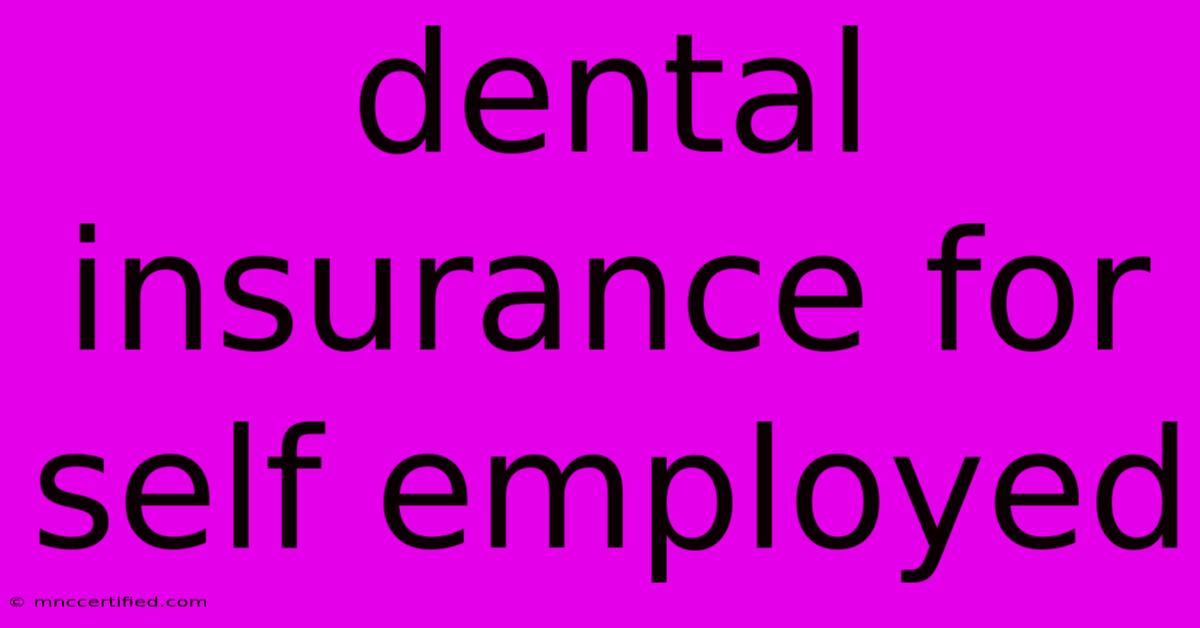Dental Insurance For Self Employed

Table of Contents
Dental Insurance for the Self-Employed: A Comprehensive Guide
Finding affordable and comprehensive dental insurance as a self-employed individual can feel like navigating a maze. Unlike employees who often receive benefits through their employers, you're responsible for securing your own coverage. This guide breaks down everything you need to know about dental insurance for the self-employed, helping you find the right plan to protect your oral health and your wallet.
Understanding Your Needs: Before You Start Shopping
Before diving into plans, assess your current dental health and anticipated needs. Consider:
- Current Oral Health: Do you have any existing dental issues requiring immediate attention? Pre-existing conditions might influence your plan choices and premiums.
- Frequency of Dental Visits: How often do you typically visit the dentist? A plan with higher annual maximums might be beneficial if you anticipate needing extensive work.
- Budget: Determine how much you can comfortably allocate monthly for dental insurance premiums. Balancing cost with coverage is crucial.
- Specific Needs: Do you have specific dental needs, such as orthodontics or implants? Ensure the plan covers these services adequately.
Types of Dental Insurance Plans: Decoding the Options
Several types of dental insurance plans cater to the self-employed:
1. Individual Dental Insurance Plans:
These plans are designed specifically for individuals and are purchased directly from an insurance provider. They offer varying levels of coverage and premium costs. Key features to look for:
- Annual Maximum: The maximum amount the plan will pay out annually.
- Waiting Periods: The time you must wait before certain services are covered.
- Deductible: The amount you pay out-of-pocket before the insurance starts covering expenses.
- Co-insurance: The percentage you pay after meeting your deductible.
2. Association Plans:
Many professional organizations and associations offer group dental insurance plans to their members. These plans often provide lower premiums than individual plans due to the larger pool of insured individuals. Check if your professional association offers such benefits.
3. Short-Term Dental Plans:
These plans provide temporary coverage, usually for a limited duration (e.g., 6 months or a year). They might be a good option if you need coverage for a specific period or are unsure about long-term commitment. However, they typically have higher premiums and limited coverage compared to long-term plans.
4. Dental Savings Plans (Discount Plans):
These aren't technically insurance plans, but they offer discounted rates on dental services from participating dentists. They are usually cheaper than insurance, but they don't cover as much. This can be a good option if you’re healthy and mostly need preventative care.
Finding the Right Plan: Tips for Self-Employed Individuals
- Compare Plans: Utilize online comparison tools to compare various plans based on your needs and budget.
- Read the Fine Print: Carefully review the policy details, including exclusions and limitations.
- Check Dentist Networks: Ensure your preferred dentist is in the plan's network to maximize cost savings.
- Consider Your Long-Term Needs: Choose a plan that caters to your current and anticipated dental needs.
- Review Your Budget: Factor the monthly premium cost into your overall budget.
Maximizing Your Dental Insurance: Practical Strategies
- Preventative Care: Regular checkups and cleanings are crucial for maintaining oral health and preventing costly problems down the line. These are usually covered at a higher percentage than more extensive procedures.
- Understand Your Coverage: Familiarize yourself with your plan's coverage details to understand what's covered and what's not.
- Negotiate with Dentists: If a procedure isn't covered, try negotiating a payment plan with your dentist.
- HSA or FSA: Explore the possibility of using a Health Savings Account (HSA) or Flexible Spending Account (FSA) to pay for dental expenses tax-free.
The Bottom Line: Protecting Your Oral Health is an Investment
Dental insurance for the self-employed might require more research and planning, but it's a worthwhile investment. By carefully researching your options, understanding your needs, and actively managing your dental health, you can find a plan that provides the coverage you need at a price you can afford. Remember to prioritize preventative care to keep costs down in the long run. Investing in your oral health today protects your smile and your financial well-being tomorrow.

Thank you for visiting our website wich cover about Dental Insurance For Self Employed. We hope the information provided has been useful to you. Feel free to contact us if you have any questions or need further assistance. See you next time and dont miss to bookmark.
Featured Posts
-
Trumps Pick Examining Rfk Jr S Leadership
Nov 15, 2024
-
Will Bondo Harden Without Hardener
Nov 15, 2024
-
Pitbull Presale Tickets Dublin Guide
Nov 15, 2024
-
Say Nothing Review A Powerful Story
Nov 15, 2024
-
Comparing Daniels And Griffins Rookie Seasons
Nov 15, 2024